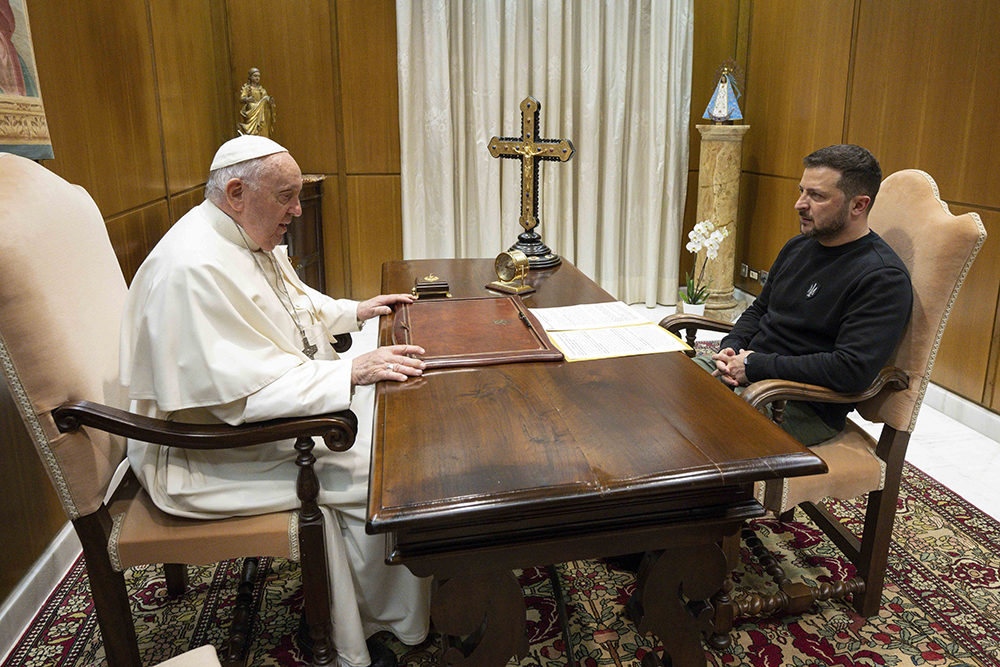
By Justin McLellan
VATICAN CITY (CNS) — Pope Francis’ comment that Ukraine should have the “courage of the white flag” and engage in negotiation to end its war with Russia was dismissed by the Ukrainian government and church leaders.
In an interview with the Swiss broadcaster RSI, the pope had said the stronger side in the war in Ukraine “is the one who looks at the situation, thinks about the people and has the courage of the white flag, and negotiates.”
Elsewhere in the interview, released in part March 9, the pope specified that “negotiation is never a surrender.”
Ukrainian President Volodymyr Zelenskyy clearly alluded to the pope’s comments in his nightly video address March 10 but made no explicit reference to Pope Francis.
Zelenskyy, speaking in Ukrainian in a video with English subtitles, thanked Ukrainian military chaplains on the frontline for supporting the troops “with prayer, conversation and deeds.”
“This is what the church is — it is together with people, not two and a half thousand kilometers away somewhere virtually mediating between someone who wants to live and someone who wants to destroy you,” he said.
Ukraine’s foreign minister, Dmytro Kuleba, was more direct in a March 10 post on X, criticizing the pope’s call for negotiations as putting good and evil “on the same footing” and urging the Vatican to “avoid repeating the mistakes of the past and to support Ukraine and its people in their just struggle for their lives.”
“Our flag is a yellow and blue one,” he said. “This is the flag by which we live, die, and prevail. We shall never raise any other flags.”
The bishops of the Permanent Synod of the Ukrainian Greek Catholic Church released a statement March 10 in which they said that “with Putin there will be no true negotiations.”
“Notwithstanding the suggestions for a need for negotiations coming from representatives of different countries, including the Holy Father himself, Ukrainians will continue to defend freedom and dignity to achieve a peace that is just,” said the statement signed by bishops including Archbishop Sviatoslav Shevchuk, major archbishop of Kyiv-Halych, and Archbishop Borys Gudziak, head of the Ukrainian Archeparchy of Philadelphia.
“Every Russian occupation of Ukrainian territory leads to the eradication of the Ukrainian Catholic Church, any independent Ukrainian Orthodox Church, and to the suppression of other religions and all institutions and cultural expressions that do not support Russian hegemony,” the statement continued.
Andrii Yurash, Ukrainian ambassador to the Vatican, went on Italian public television March 10 and said in dealing with Russian leader Vladimir Putin, the international community should learn from the lessons of World War II. “The greatest lesson from this war is that no one tried to put Hitler at ease” but rather “everyone tried to weaken him and to strengthen his adversaries.”
Poland’s foreign minister responded to a post on X March 10 with the pope’s comments suggesting the pope should try “encouraging Putin to have the courage to withdraw his army from Ukraine.”
Several diplomatic representatives to the Vatican posted on X to support their solidarity with Ukraine after the pope’s comments were reported, including the European Union representative and the British and German ambassadors to the Holy See.
Matteo Bruni, director of the Vatican press office, told reporters March 9 that Pope Francis’ “white flag” comment was meant “to indicate the cessation of hostilities, a truce reached with the courage of negotiation” and not a surrender.
